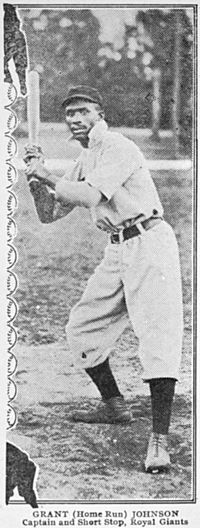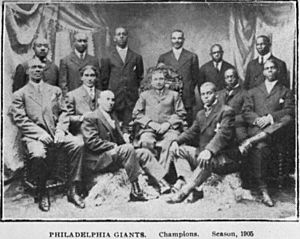Home Run Johnson facts for kids
Quick facts for kids Home Run Johnson |
|||
|---|---|---|---|

Johnson with the Brooklyn Royal Giants in 1907
|
|||
| Shortstop / Second baseman | |||
| Born: September 23, 1872 Findlay, Ohio |
|||
| Died: September 4, 1963 (aged 90) Buffalo, New York |
|||
|
|||
| debut | |||
| 1893, for the Findlay Sluggers | |||
| Last appearance | |||
| 1923, for the Buffalo Giants | |||
| Teams | |||
|
|||
Grant U. "Home Run" Johnson (born September 23, 1872 – died September 4, 1963) was an amazing American baseball player. He played as a shortstop and second baseman in the Negro Leagues. His career lasted over 30 years!
He played for many top teams during the "deadball era." This was a time when home runs were rare. Johnson was known as one of the best power hitters of his time. He was born in Findlay, Ohio, and passed away at 90 years old in Buffalo, New York.
Contents
Baseball Career Highlights
Johnson started his baseball journey in 1893. He played as a shortstop for the semipro team called the Findlay Sluggers. The very next year, he earned his famous nickname "Home Run" Johnson. He hit an incredible 60 home runs that season!
Joining the Page Fence Giants
In 1894, Johnson teamed up with another famous player, Bud Fowler. They helped create a new team called the Page Fence Giants in Adrian, Michigan. The team started playing in the spring of 1895.
Johnson was the shortstop and captain for the entire four years the Page Fence Giants played. In 1896, he even pitched in a special game. He was the winning pitcher in the Black Baseball World Championship series. This big game was against the Cuban X Giants.
After 1898, the Page Fence Giants stopped playing. Johnson and most of his teammates moved to Chicago. There, they played for the Chicago Columbia Giants in 1899. He also played for the Chicago Unions in 1900.
Playing for the Cuban X-Giants
In 1903 and 1904, Johnson played for the Cuban X-Giants. He was the captain of this team too. In 1903, he led them to win the colored championship. They beat the Philadelphia Giants for the title. Some of his teammates included baseball legends like Rube Foster and Charlie Grant.
Time with the Philadelphia Giants
Johnson joined the Philadelphia Giants in 1905. He was 33 years old that season. His hitting and occasional pitching really energized his new team. He was known for his powerful swings.
Johnson led the team in home runs with 12 that year. He was also a very fair player. He always ran hard on ground balls and rarely argued with umpires. He hardly ever struck out, which was very unusual for a power hitter.
Leading the Brooklyn Royal Giants
In 1906, Johnson moved to the Brooklyn Royal Giants. He was again named captain of this team. He led them to win championships in both 1908 and 1909.
A sportswriter named Harry Daniels praised Johnson in 1909. He said Johnson was "always a hard, consistent hitter, fielder, and base runner." He also called him "a great handler," meaning he was a good leader.
Later Teams and Nicknames
In 1910, Johnson signed with Rube Foster's Leland Giants. He had a fantastic season, hitting for a .397 batting average. Around this time, people started calling him "Dad" Johnson. He still kept his old nickname, "Home Run Johnson."
From 1911 to 1913, Johnson played for the New York Lincoln Giants. He continued to hit very well, with batting averages of .374, .413, and .371. In 1913, the Lincoln Giants won the eastern title. They then beat the Chicago American Giants in the championship playoff. Later in his career, he played for the Pittsburgh Colored Stars of Buffalo. He also managed the Buffalo Giants.
Later Life and Legacy
Johnson kept playing baseball with smaller teams until 1932. He finally retired from the game at 58 years old. After baseball, he lived in Buffalo, New York. He worked for the New York Central Railroad.
Grant Johnson was buried in Lakeside Cemetery in Hamburg, New York. This was on September 14, 1963.
In 2021, Johnson was considered for the National Baseball Hall of Fame. He was on the final ballot for the Class of 2022. Even though he didn't get enough votes that time, it showed how important he was to baseball history.


